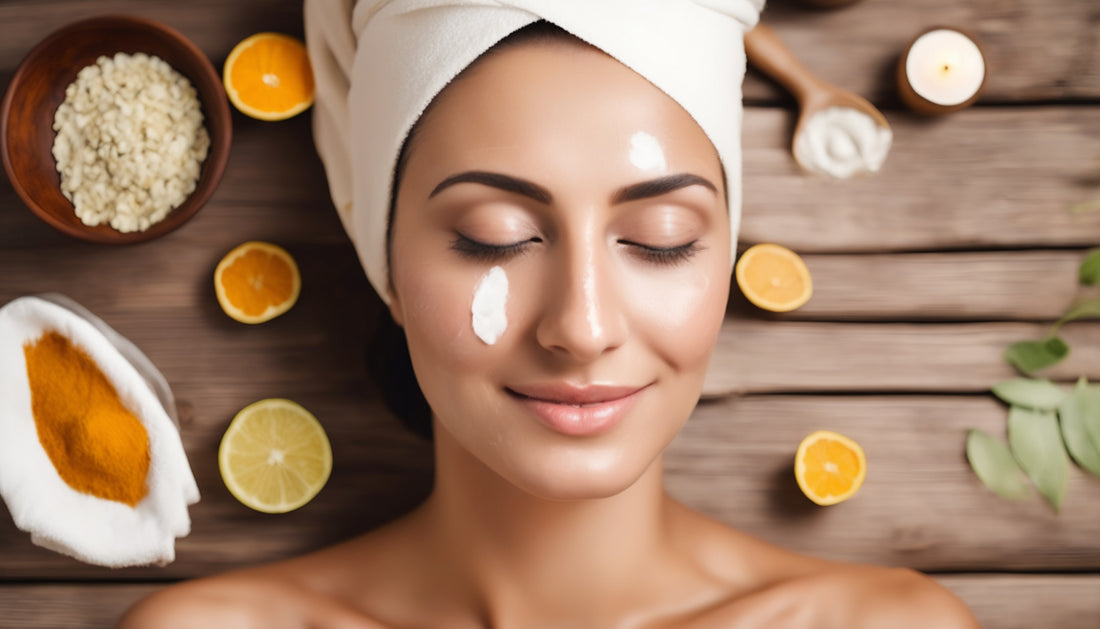A quick look at Azelaic Acid Serum
Azelaic acid is an organic compound derived from grains like wheat, rye, and barley. It is often used as a serum to combat acne, rosacea, and hyperpigmentation. Its unique exfoliating properties help eliminate dead skin cells and unclog pores. However, despite its multiple benefits, people may still seek natural alternatives because of possible side effects or a personal preference for holistic remedies.
Ayurvedic alternatives to Azelaic Acid
Ayurveda, an ancient Indian healing practice, offers a holistic approach to health and wellness. It relies on the abundant natural resources for developing effective skincare regimens. Here are some potent ayurvedic ingredients that can make your skin look radiant, replacing the need for azelaic acid serum:
1. Turmeric (Curcuma longa)
Turmeric, popularly known for its anti-inflammatory and antimicrobial properties, is ideal for treating various skin issues. Its active compound, curcumin, reduces acne-causing bacteria, promotes collagen production, and lightens hyperpigmentation. Make your own soothing turmeric mask by mixing a teaspoon of turmeric, half a teaspoon of raw honey, and a few drops of lemon juice.
2. Sandalwood (Santalum album)
Sandalwood, with its anti-inflammatory, antimicrobial, and toning properties, helps soothe irritated skin, clear acne, and control excessive oil secretion. The luxurious aroma of sandalwood as a face mask or a spot treatment offers the added benefit of aromatherapy. Mix sandalwood powder with rose water or milk for a rejuvenating mask.
3. Neem (Azadirachta indica)
Neem has been a staple ingredient in Indian households for centuries, attributed to its potent antibacterial, antifungal, and anti-inflammatory properties. Using neem oil, leaf extracts, or neem-based face washes regularly can reduce breakouts, control excess oil production, and maintain a healthy skin barrier.
4. Aloe Vera (Aloe barbadensis)
Renowned for its soothing properties, Aloe Vera is exceptionally versatile for those with sensitive skin or prone to redness. Its healing properties help promote cellular regeneration, reducing signs of aging and acne scars. You can simply cut an aloe leaf and apply the gel directly to your skin, or look for products that incorporate aloe extract.
5. Liquorice (Glycyrrhiza glabra)
Liquorice, another powerful Ayurvedic ingredient, is known for its natural skin-lightening effects and reducing inflammation. Its primary active compound, glabridin, inhibits tyrosinase activity, preventing hyperpigmentation. It also soothes redness caused by acne and rosacea. You can find liquorice extract in face masks and serums.
Tailoring your Ayurvedic skincare routine
Building an ayurveda-inspired skincare regime begins by understanding your skin type (Vata, Pitta, or Kapha) and selecting ingredients that cater to its needs. Owing to Ayurveda's holistic approach, it also emphasizes the importance of nourishment from within - adopting a balanced diet, maintaining optimal hydration, and managing stress for a glowing complexion.
Before incorporating ayurvedic alternatives to your skincare routine, remember that natural ingredients can sometimes cause an allergic reaction or sensitivity, especially among those with sensitive skin. Always conduct a patch test before applying new products or ingredients. If in doubt, consult an Ayurvedic practitioner or a dermatologist to understand which ingredients work best for your skin type.
With the knowledge of these ayurvedic alternatives, you can create a skin-care routine that sufficiently replaces Azelaic Acid Serum and opens up a new world of natural and holistic skincare possibilities.
